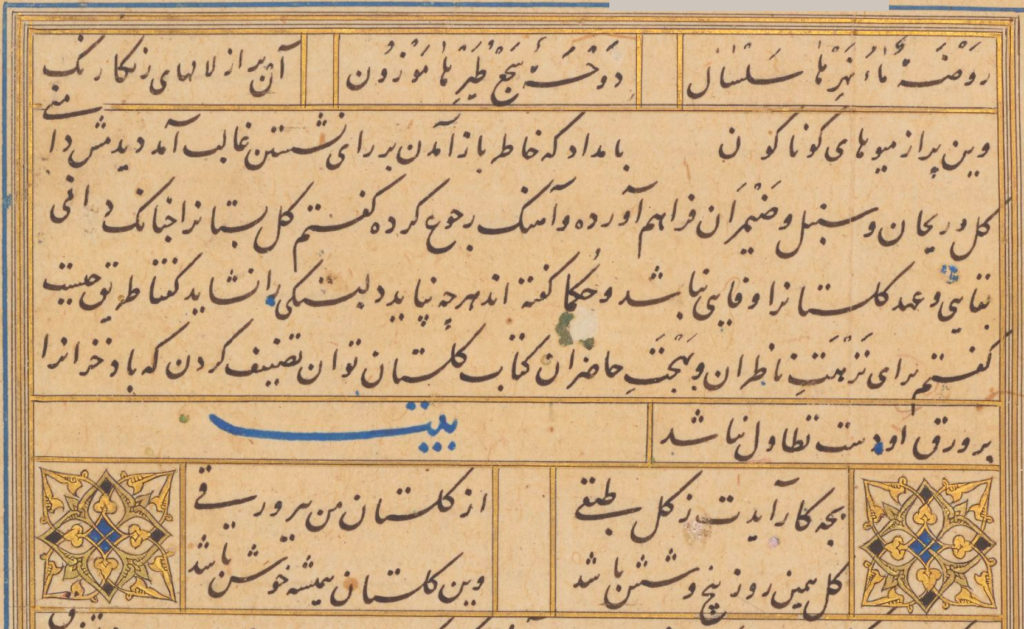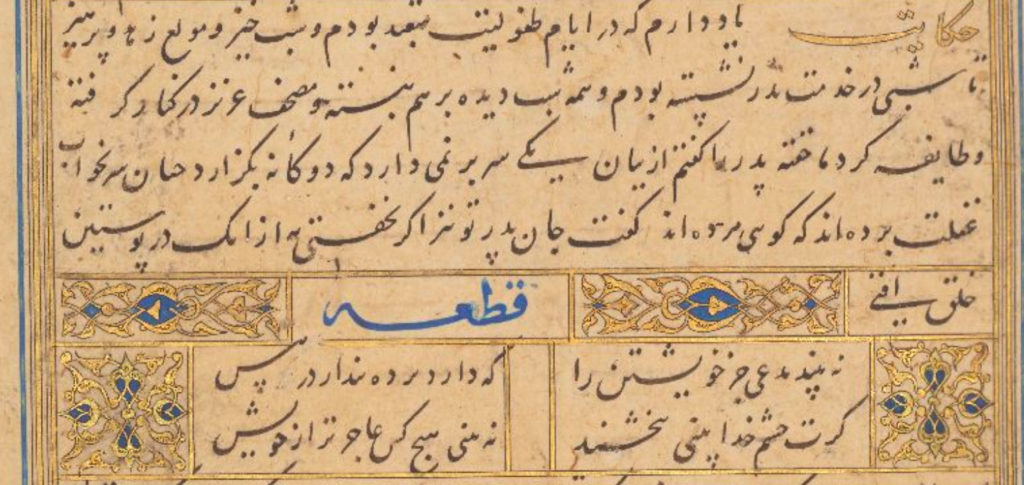
Link to Chester Beatty Digital Collections
Oration (non dramatic)
The author (Sa’di) in his own voice, mentions of a trip with a friend in some rural agricultural region, they spent the night and the excerpt narrates the following morning when he first conceived the idea of writing a book called Gulistan:
(next) Morning the thought of returning (to the city) overwhelmed the (urge for) staying, and I saw him bunching flowers, Basil, Hyacinth and wild fragrant herbs; determined to return.
I said: The flower of the meadows, as you are surely aware, does not last and the promise of the meadow (to last forever) is never fulfilled! And the wise sages advised “Avoid attachment to what does not last”.
He then asked: What now to do?
I replied: I shall author a book called Gulistan (Colorful Meadows) a pleasurable promenade and a delightful display for audiences, that no autumn gales could savage its leaves.
What use a tray of flowers for you
Instead take a leaf from my Gulistan
The flower might last five or six days
Yet this Gulistan unfailingly verdant
Coda
Gulistan is a collection of events and personalities that were met during Sa’di’s long journeys. True nature of men and women and peoples are made patent in front of the eye of his heart, and most plain his own character within. He recorded these precious findings on pages of this book called the Colorful Meadows! The foul or inappropriate conduct or defects of personalities are still fragrant flowers blooming midst the leaves of Gulistan, for Sa’di all human endeavour is precious and vernal.
How could defective conduct be precious? Since he quotes Luqman giving reason for being so learned wise: What defect of others I had observed I avoided, and what good I adopted.
Moreover Sa’di observes the defect of his own Self when chided sleepers, whilst busy in worship himself, and his father’s gentle correction wishing that he was also asleep as not to backbite! To Sa’di faults of others could easily be his faults as well, given the fertile circumstances.
واژه
Terminologies
ستان
Stān: end-suffix(پسوند) indicating place of aggregation or accumulation or portal of something (its noun) e.g. Kurdistan
کرد+ستان
Geographic place for Kurdish people or
دادستان
Courthouse , for Dād (داد) meaning Justice and Dād-e-Stān means place for the justice and many other such usages.
* (فعل امر) امر به این معنی هم هست یعنی بستان و بگیر. (برهان ). امر به ستاندن . (رشیدی ) (آنندراج ).
* ‘ستان ، ستان ; (پسوند) جای انبوهی چیزها چون گلستان و هندوستان و نیستان و نرگسستان و سیستان . (آنندراج ) (غیاث ). در ترکیبات مفهوم محل ، ناحیه ، شهر، جهان ومانند آنها دهد. این پسوند برای ساختن اسماء مکان واسماء زمان (فقط در زمستان و تابستان ) بکار رود. پارسی باستان و اوستا «ستانه » (جا، محل )، پهلوی «ستان » ، ارمنی عاریتی و دخیل «ستن » ، هندی باستان «ستهنه » (جا، محل ) و «ستهانه » از ریشه «ستا» (در اوستاو پارسی باستان بمعنی ستادن و ایستادن ).
بستان بوستان
Bustan: Place for fragrant flowers, herbs and fruits, or any place for good scents. For (بو) reads as Boo namely scent, there
بو+ستان
stands for place for fragrant scents. Arabicized (معرب) namely a loan word into the Arabic pl. بساتین .
گلستان
گل+ستان
Gulistan: Place for growing and caring for colorful flowers namely meadows. It seems there is connotation for caretakers managing these meadows (Translator’s note and needs further verification).
گلزار و گلستان را گویند و مخفف بوستان هم هست . (برهان ). بالضم معرب بوستان (از منتخب ) در سراج اللغات نوشته که : لفظ فارسی است مرکب از کلمه بست بالضم که بمعنی گلزار و جاییکه میوه خوشبو در آن باشد و الف و نون زائد مثل شاد و شادان . (غیاث ). بمعنی گلزار و باغ که آن را گلستان نیز گویند و بستان مخفف بوستان است و آن جایی را گویند که بوی گل و ریاحین در آنجا بسیار باشد. (انجمن آرا).
ضمیران
Dhaimrān: Wild grown fragrant herbs. Persians would read that Zaimrān.
ضومران . ضومیران . (ابن البیطار). ضمیران . ریحان دشتی . نوعی از ریحان . نوعی است از ریحان دشتی .
بهجة بهجت
Bahja-t: Pleasant colors inducing beatitude in the viewer. Original word from Qur’an
27:60. وَأَنزَلَ لَكُم مِّنَ السَّمَاء مَاء فَأَنبَتْنَا بِهِ حَدَائِقَ ذَاتَ بَهْجَةٍ
… and (who) sends down (prepares) for you water from the skies? For it is by this means that We cause gardens of beauty to grow…
نزهت نزهة
Nuzha-t, Nazha-t: Pleasure ride, promenade. Arabic for being distanced, in particular distanced from defect and unpleasantness, to be pure and good.
دوری . (منتهی الارب ). بعد. (ازاقرب الموارد). گویند: هو بنزهة من الماء; ای ببعد.(منتهی الارب ).* اسم است از تنزه . گویند: ارض ذات نزهة. (از اقرب الموارد). ج ، نُزَه .* دوری از ناخوشی و پژمانی . (منتهی الارب ) (ناظم الاطباء).* دوری از عیب و زشتی . بی عیبی . پاکیزگی . نکوئی . (آنندراج از کشف اللغات و صراح و لطائف و منتخب اللغات ).* تفرج و گردش درسبزه زارها و بساتین و باغ ها. (ناظم الاطباء). نزهت .
آهنگ
Āhang: To will with volition.
قصد. عزم . عزیمت . عمد. (ادیب نطنزی ). تعمد. نیت . بسیج . تامیم . استواء. اندیشه . توجه به . برفتن بسوی . حرد. نحو. اراده:
خسرو غازی آهنگ بخارا دارد
زده از غزنین تاجیحون تاژ و خرگاه .
بهرامی .
نوا، لحن . 4 – فحوی، مفاد. 5 – سان، گونه، روش . 6 – قطعة موسیقی . 7 – هر صدای موزون . 8 – میزان تغییر چیزی در طول زمان، روند
بامداد
Bāmdād: Dawn, morning, sunrise to midday.
داده بام . آفریده فروغ . بخشیده روشنائی . داده صبح .* بام . گاه صبح
وقت طلوع فجر. پیش از طلوع آفتاب
از طلوع فجر تا ظهر را هم بامداد گویند.(فرهنگ نظام )
بامداد بمعنی داده و بخشیده و آفریده فروغ است
بقا
Baqā: To last to persist.
وفا
Wafā: to be loyal with devotion and to honor covenants and promises.
تصنيف
Tasnif: to author and compose text or book.
تطاول
Tatāwul: Tyranny cruelty.
طبق
Tabaq: Wide shallow pan/tray usually made of metal or wood to carry food items
ورق
Waraq: Leaf of any plant or page of a book or a loose page of some text. Poets used the double meaning as metaphor to call their pages leaves.
References
https://archive.org/details/GulistanESadiBaManiEVazhahaVaSharhEBaithaVaJumlahaEDushvarVaBarkhiNuktahaEDastooriOAdabiFarsi/page/n59
https://archive.org/details/GulistanSaadiShirziPersianTextEnglishTranslation/page/n5
Acknowledgements
With thanks to Moya Carey, Curator of Islamic Collections, Chester Beatty, Dublin
© 2019-2002, Dara O. Shayda
License
https://creativecommons.org/licenses/by/4.0/





